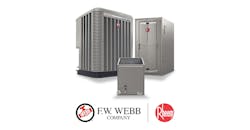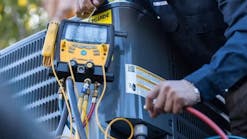Happy, satisfied customers who are cheerleaders for your services will bring you more solid profits than just about any amount of money you could spend on advertising.
Your customers, that is, you the contractor...are your employees. Any one of your field personnel is in a position to make you more money than any single customer.
So, are your field personnel cheerleaders for you? Have you treated them like customers? Have you sold them on your products?
Finding and keeping good field personnel is actually more difficult than, and at least as important, as getting and keeping customers.
By the time one of your service technicians has hit the job site, you’ve already got a customer. Your biggest expense is getting the service tech out to the job site. Once there, the real profits lie in upgrading the call in an ethical way.
It’s amazing how often a blind eye is turned to additional products and services that the customer would really benefit by owning, but are never offered.
I call that “tunnel vision.” In my travels, I’ve asked numerous techs who have just demonstrated “tunnel vision” why they do it, and these are the most common reasons they’ve given me:
1. Don’t want to be identified with sales or as salespeople.
When I ask service technicians, “What kind of words do people use to describe salespeople?” They’ll often respond with words like, “Liar, slick, egotistical, con artist, cutthroat, blue suede shoes, greedy” and a host of other unflattering terms. Let’s face it, if service personnel wanted to be sales personnel, they would have gone into sales.
I’ll also ask, “Who has more credibility in the home, a salesman or a service tech?” They’ll invariably reply, “a service tech.”
So, be certain that your employees know that you never want them to step out of the role of service and into the role of salesperson.
Does this mean that they shouldn’t sell for you? No, it doesn’t. But it does mean that you want them to avoid any and all of the stereotypical behavior of the classic “shyster” salesman.
2. Negative attitude toward company, boss or job.
Most people in a sales position of any sort feel they’ve been shorted on their commissions at one time or another. I’ve seen more than one technician that was excellent at sales, stop selling, and consequently lower their own income and overall job satisfaction, because they felt that at one time they were unfairly cheated on a commission. Make absolutely certain that, if you’re paying commissions, everyone has a clear understanding of exactly what they’re supposed to be paid, and that you enclose a detailed statement listing exactly what customer they are being paid on, for what product, and how much, in every commission check.
3. See no value in "high-priced" products.
This falls back on training. It’s often assumed that your employees, especially long term employees, know all the features and benefits of all your products and doing business with your company.
Never under estimate the value of repetition in your training. No one listens to one hundred per cent of everything they’re being told and, even if they did, no one has one hundred per cent retention.
Make certain everyone understands the features and benefits of every product. Give examples of when the product should be recommended and make certain they know how to price it.
Don’t assume that your employees know the benefits of doing business with your company either. Even if they do, make certain that they can, in a quick, clear and concise manner, convey them to a customer.
4. Mistakes might bring humiliation, ridicule
The more someone sells, the more opportunities there are for mistakes. Yell at or embarrass someone for making a mistake on a sale just one time and you may well kill sales from that person for the remainder of that individuals tenure with your company.
5. No confidence in their own communication skills.
This could also be stated that the concept of selling is not clear and clean; it hasn't been proceduralized. As a contractor, your success is largely dependent on the success of your service technicians as salespeople, so get them some sales training.
6. Feeling of being rushed.
This is the biggest impediment to increasing the dollar amount of your average service call that I’ve seen. If you won’t let your field service personnel go home until all calls are run (or until they drop dead from exhaustion), you are inadvertently shifting their focus from maximizing opportunities and providing the ultimate service experience on every call, to simply trying to get in and get out and work as fast as they can, doing as little as possible on each call.
Instead of allowing the company to go into a panic mode during the busy times, and focus on running as many calls per day and squeezing every little bit of work you can get out of your service techs, counsel with your dispatcher and service techs on shifting the focus from running the maximum number of calls per day, to bringing in the maximum amount of profit per day. Make each call count.
Don’t give your techs a list of eight or ten calls in the morning and tell them they can’t go home until they finish those calls. They won’t have the time to deliver a superior level of service. Dispatch them one at a time. That way your people won’t get worried that they’ll never make it home that night and start doing rush work.
Some contractors will say, “In my area, people won’t wait. We’ve got to get out there as soon as possible. If we don’t, we’ll lose them as customers.”
Let the law of supply and demand work for you. If you’ve really got more calls to run than you’ve got personnel to run them, raise your prices.
A common response to that is, “If I raise my prices, I’ll lose half my customers!” Maybe that would be the best thing for you!
If your net pre-tax profit is 10%, and you increase your prices by 10%, and as a result, you lose half of your customers, you would still increase your bottom line profits because your 10% price increase is pure profit, but since your running fewer calls, your expenses have gone down.
Let the people who want the work done cheaper go to your competition and drive them crazy and work them to death. Run fewer calls for more profit per call with fewer employees who are more relaxed, working safer, doing a better job on each call and thoroughly satisfying each customer on every call and you, your employees and your customers will all be happier. You’ll all get more enjoyment out of life and your jobs and your customers will send you more referrals than you can probably handle and you’ll have a waiting list of qualified techs who want to get on your team.
Charlie Greer was voted Favorite Industry Sales Trainer and HVAC Consultant-of-the-Year. He's also a member of the Contracting Business Hall of Fame and the creator of "Tec Daddy's Service Technician Survival School on DVD." For info on Charlie's services, go to www.hvacprofitboosters.com. Email your comments on this column or your sales questions to [email protected].








